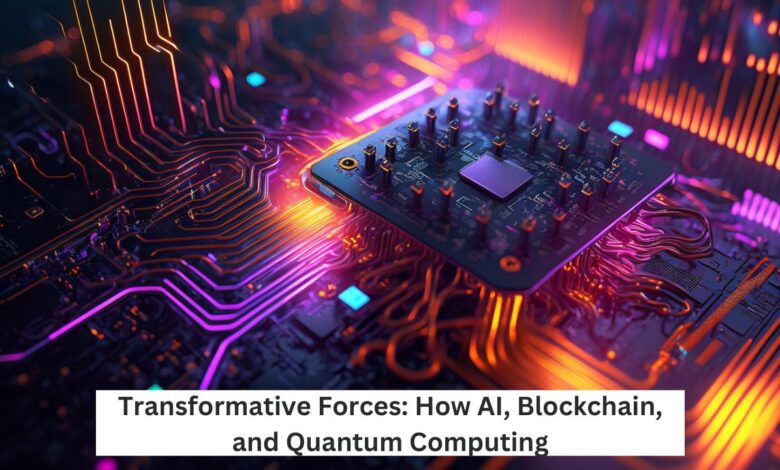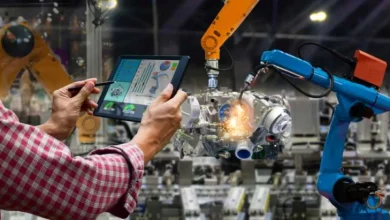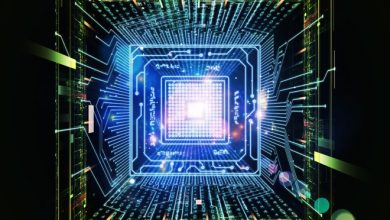Transformative Forces: How AI, Blockchain, and Quantum Computing

The future is being shaped by developing technology in our world that is advancing so quickly. Blockchain, quantum computing, and artificial intelligence (AI) are some of the most revolutionary and after bca which course is best disruptive breakthroughs. These innovations are transforming whole sectors, having an effect on our day-to-day existence, and opening up previously unthinkable new avenues. We will examine these revolutionary technologies’ fundamental ideas, present uses, and possible long-term effects in this thorough investigation.
Artificial Intelligence (AI): The Age of Smart Machines
The goal of the computer science discipline known as artificial intelligence, or AI, is to build machines that are capable of carrying out activities that normally call for human intelligence. These tasks include a broad spectrum of tasks, including decision-making, picture recognition, speech recognition, and natural language processing. Recent years have seen tremendous advancements in AI, which is now incorporated into many facets of our daily life.
- Deep learning and machine learning: Machine learning is a branch of artificial intelligence that lets computers learn from data and get better over time. The machine learning discipline of deep learning has shown amazing results in voice and picture recognition, among other fields. Siri and Alexa, two examples of virtual personal assistants, run on it.
- Natural language processing, or NLP, is the technology that enables computers to comprehend and interpret spoken language. This technology facilitates simpler international communication using chatbots and language translation technologies.
- AI in Healthcare: AI is helping doctors find new drugs, analyze medical pictures, and diagnose illnesses. AI-powered diagnostic technologies might save expenses and enhance patient outcomes.
- AI in Finance: Fraud detection, algorithmic trading, and customer support are among the applications of AI in the financial industry. In customer service and financial planning, chatbots and robo-advisors are growing in popularity.
- AI in Transportation: One of the best examples of how AI is affecting transportation is with autonomous cars. They navigate and make judgments in real time using sophisticated AI algorithms.
- AI is finding more and more uses in a variety of sectors, including industry, education, and entertainment as well as retail and leisure. It has the power to completely change the way we live, work, and use technology.
Blockchain: Revolutionizing Trust and Security
The advent of cryptocurrencies has brought blockchain technology to the forefront, but its promise goes well beyond virtual currencies like Bitcoin. Fundamentally, blockchain is a distributed ledger system that securely and openly records transactions via a network of computers. Numerous industries can benefit from its decentralization, immutability, and transparency properties.
- Cryptocurrencies: Blockchain technology is the foundation for cryptocurrencies like Ethereum, Bitcoin, and others. They provide a safe, decentralized method of doing financial transactions without the need for middlemen.
- Supply Chain Management: Supply chains may be made more transparent and trustworthy by using blockchain technology to track the production and delivery of items. This is especially crucial for the food and pharmaceutical sectors.
- Smart contracts are self-executing agreements that have the terms encoded directly into the code. They eliminate the need for middlemen in a variety of transactions by automatically enforcing and facilitating agreements.
- Identity Verification: By improving digital identity verification, blockchain helps lessen fraud and identity theft. Users are in charge of their own data, allowing only those with permission to view it.
- Voting Systems: Blockchain-based voting systems have the potential to improve the security and transparency of elections, making them less vulnerable to fraud.
The fundamental idea behind blockchain technology is a decentralized, tamper-proof ledger that has the power to completely change the way we build security and trust in a variety of contexts.
Quantum Computing: A New Era of Computing Power
The future of computer power is represented by quantum computing. It makes use of quantum mechanical concepts to process and analyze data in completely novel ways. Even though technology is still in its infancy, quantum computing has the potential to completely transform a wide range of industries, including artificial intelligence, medication development, material science, encryption, and more.
- Quantum bits, or qubits, are different from classical bits in that they can exist in more than one state at once because of the concepts of superposition and entanglement. Classical bits can only exist in a state of 0 or 1. This makes it feasible for quantum computers to carry out intricate computations at rates that are presently unattainable for conventional computers.
- Cryptography: Many of the encryption techniques in use today might be broken by quantum computers. They may also be utilized to develop brand-new, highly secure encryption techniques that are impervious to quantum assaults.
- Material Science: The behavior of molecules and materials at the quantum level may be simulated via quantum computers. This has potential for the creation of novel substances, medications, and energy-related products.
- Machine Learning: By improving machine learning methods, quantum computing can lead to more effective data processing and analysis.
- Quantum computers are particularly good at handling complicated optimization issues, which have applications in banking, logistics, and other fields.
It’s crucial to remember that quantum computing is still in its infancy and that businesses like IBM and Google are working to create large-scale, useful quantum computers. With further advancements in technology, it is possible to solve issues that were either unsolvable or took too long to solve with traditional computers.
The Intersection of These Technologies: Convergence and Synergy
The confluence and synergy of these new technologies is equally as important to the future of technology as their individual advancements.
- AI and Quantum Computing: Quantum computing has the potential to dramatically speed up machine learning algorithms, making AI more powerful and efficient.
- Blockchain and AI: Combining blockchain with AI can enhance the security and transparency of AI algorithms, making them more trustworthy in critical applications like autonomous vehicles and medical diagnosis.
Challenges and Considerations
While these emerging technologies offer tremendous promise, they also come with their own set of challenges and considerations.
- Ethical and Privacy Concerns: The use of AI in surveillance, the potential misuse of blockchain for illegal activities, and the ethical implications of quantum computing raise important questions about regulation and oversight.
- Security Risks: The very features that make blockchain and quantum computing secure also pose potential threats, such as the vulnerability of encryption to quantum attacks.
- Workforce Transformation: The adoption of these technologies requires a workforce with new skill sets. Preparing the workforce for these changes is crucial.
- Environmental Impact: Quantum computers, in particular, have high energy requirements, which raise environmental concerns.
- Regulation and Standards: The rapidly evolving nature of these technologies challenges traditional regulatory and standard-setting processes. Striking the right balance between innovation and safeguarding the public interest is essential.
The Future Landscape
Future developments in artificial intelligence (AI), blockchain technology, and quantum computing are certain to have a significant impact on our planet. These technologies hold the key to unlocking some of the most challenging problems confronting humanity, from quantum-powered AI and sophisticated supply chain management to customized healthcare and secure digital identities.
But change is also happening more quickly, so people, institutions, and governments all need to alter and adapt. We may anticipate new laws and rules in the upcoming years that will control these technology, encourage moral usage, and handle any hazards.
Conclusion
The combination of these technologies promises even greater advancements, and they are already having a substantial influence. Individuals and organizations need to stay educated, adjust to new difficulties, and after bca which course is best take advantage of the possibilities these ground-breaking technologies bring in order to effectively traverse this shifting terrain.



